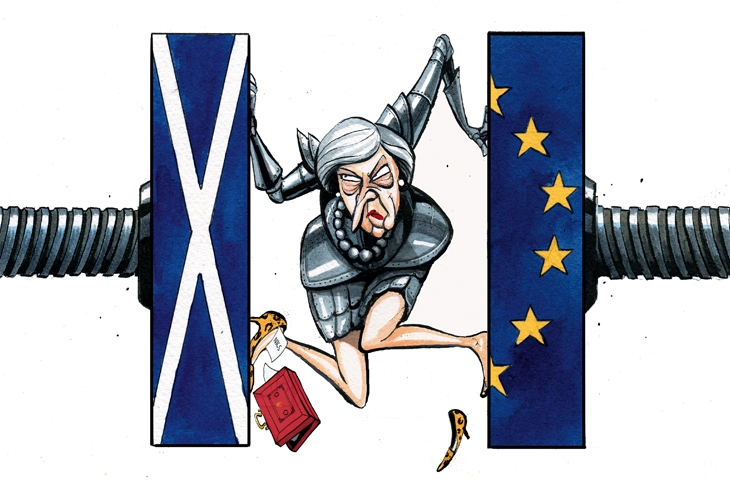On this week’s edition of The Spectator Podcast, we discuss Theresa May’s double bind in Edinburgh and Brussels, Milton’s cultural relevance in 2017, and the slaughter of Cypriot songbirds.
First, Lara Prendergast spoke to James Forsyth about his cover piece in this week’s magazine. Have Theresa May’s negotations with the European Union been hamstrung by this latest intervention from Holyrood? And will she be able to find a version of Brexit that soothes the fears of pro-Remain Scots? Time will, of course, tell, but in the meantime James joins the podcast along with the Spectator’s Scotland Editor, Alex Massie. As James writes in his piece this week:
“Theresa May is a cautious politician. She has risen to the top by avoiding unnecessary risks; no one survives 18 years on the Tory front bench by being a gambler. But few prime ministers have the luxury of choosing their battles, and she would not have chosen the two that may now define her premiership: successfully negotiating Britain’s exit from the European Union while saving the United Kingdom. If she achieves both, she will join the pantheon of great prime ministers. If she fails, she’ll be keeping Lord North company in the history books.”
Nicola Sturgeon’s position looks equally precarious. As Alex Massie tells the podcast:
“I think Nicola Sturgeon is absolutely right when she says this isn’t her preferred beginning to the process, but, as soon as Scotland voted differently from the rest of the United Kingdom last year, she said that a referendum now had to be on the table. After a while that builds up a bit of momentum and you have to go for it, even if it is a high risk gamble.”
The country has yet to come to blows over Brexit, but the great bard of the English Civil War, John Milton, continues to have cultural currency. So says Boyd Tonkin in this week’s magazine, and he joined the podcast along with the Spectator’s Literary Editor (and host of our Books podcast) Sam Leith to ask how Paradise Lost reads in 2017. As Boyd writes:
“Milton, as much as Shakespeare, remains our contemporary. As Wordsworth put it in a sonnet from 1802, ‘Milton! thou shouldst be living at this hour:/ England hath need of thee.’ One half of a nation almost as bitterly — if not as bloodily — divided as in his day needs to understand how the blind, scorned radical, ‘though fallen on evil days… In darkness, and with dangers compassed round’, channelled his dismay at the failure of England’s revolution and the restoration of monarchy into a masterpiece that finds salvation through despair. In 1660, Milton was arrested, imprisoned and might have gone to his death as an impenitent regicide without a few well-placed admirers. His epic, with its aim to ‘assert eternal providence/ And justify the ways of God to men’, climbs from his pit of disillusion to find meaning and hope in calamity. A hero for Remainers, then.”
And finally, on the Mediterranean island of Cyprus, tiny songbirds are being lured – with speakers blasting our faux birdsong – into nets, where they are killed and sold to the restaurant trade as a local delicacy. Much of the carnage takes place on the land of a British army base, and Simon Barnes questions why they have been unable to do more to prevent this illegal practice. He joins the podcast, along with the RSPB’s Guy Sharrock, and writes about why the practice is irredeemable:
“You can oppose the industry on grounds of squeamishness: images of ambelopoulia [the dish made from songbirds] are deeply unattractive to British eyes. You can oppose it on grounds of welfare: the process of trapping and killing is unquestionably cruel, and in many eyes morally repugnant. You can oppose it on simple legal grounds. You can oppose it on practical grounds: a criminal industry is a dangerous and disruptive thing to allow in any country. You can oppose it on grounds of international wildlife conservation: a world with fewer songbirds is a sad thing, both for humans and for songbirds.”

This podcast is sponsored by Berry Bros. & Rudd, who have long supplied wine for The Spectator. If you’ve always wanted to start a wine cellar, 2017 could be the perfect time. Whether you are looking to buy for future drinking, for investment or a little of both, Berry Bros. & Rudd’s Cellar Plan is designed to suit all tastes and budgets. A personal Account Manager will be on hand to offer advice and assistance, and enable you to benefit from three centuries’ worth of relationships with the leading wine growers. To find out more about starting a wine cellar with Berry Bros. & Rudd, visit bbr.com/cellarplan









Comments